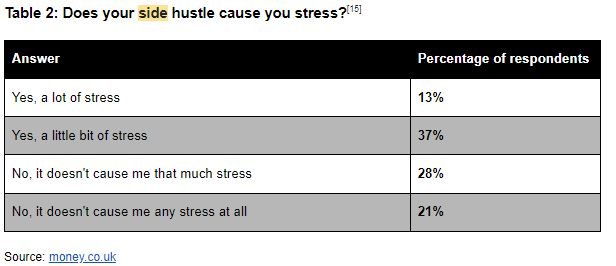Cost Of Living Sees Side Hustles Soar As Brits Seek Out Extra Cash
 As inflation drives up the cost of everyday necessities, many Brits are searching for ways to supplement their incomes. Almost a third of workers (31%) already have a ‘side hustle,’[4] whilst a further 42% are considering taking one up[5]. A second job can take many different forms, but whether reselling clothes, working as a courier, or tutoring online, a side hustle requires a person to use their own free time to start and run a business.
As inflation drives up the cost of everyday necessities, many Brits are searching for ways to supplement their incomes. Almost a third of workers (31%) already have a ‘side hustle,’[4] whilst a further 42% are considering taking one up[5]. A second job can take many different forms, but whether reselling clothes, working as a courier, or tutoring online, a side hustle requires a person to use their own free time to start and run a business.
Money.co.uk business loans investigated how many Brits have turned to side hustles, and the reasons why. By surveying over 2,000 Brits about side jobs, money.co.uk business loans found out how many workers wish to start a side hustle, and the stress levels of those already running one[6].

Almost a third (31%) of workers already work two jobs[8], and over four in ten (42%) British workers want to take up a side hustle[9], compared to just 28% who are not considering the opportunity[10].
The potential to make more money was overwhelmingly given as respondents’ main motivator for taking on or considering a side job. Seven in ten (71%) of those asked gave this as one of their top reasons for starting (or wanting to start) a side hustle[11]. Almost a quarter (24%) of respondents are not satisfied with their main jobs, so have turned to a side hustle to fulfill their passion[13].
One in five (18%) respondents said that they hope to one day be able to leave their main job in favor of the business they would start[14]. The search for financial stability, and the ability to be one’s own boss, drives UK workers in search of a side job.

Over half (net 51%) of those with side jobs stated that their side hustle causes them stress[16], with 13% responding that they face “a lot” of stress[17]. Pressure from the focus of turning their business profitable, and the possible dependence on this in order to supplement their main income, is likely putting stress on workers with a side hustle.
Cameron Jaques, a business expert at money.co.uk business loans, shares tips on starting your own business:
“The influence of the cost of living crisis on Brits’ attitudes to work is not to be understated. With over seven in ten workers saying they started their side gig as a way to make more money[18], it’s clear that people are giving up their free time in the hopes of financial stability.
“If you are thinking about topping up your income by starting your own side hustle, here are our top considerations to take into account:
- Setting up your business: There are three main structures your business can take: sole trader, partnership, or limited company; and each route has different tax implications. For instance, a limited company is an entity legally separate from its owners and is therefore required to submit yearly tax accounts and pay corporation tax. You can use money.co.uk’s business registration guide to determine which is the right model for your company, and your tax obligation.
- Consider your tax payments: If your business is earning less than £1,000 a year then you don’t need to register with the HMRC[19] – this is perfect if you want to begin testing the waters by starting small. This £1,000 applies to income, not profit, therefore you are legally required to register that you have earned this much, even if your expenses were high.
- Breaking even: Whichever business you decide to start, it’s important to know how to calculate your break-even point. You can do this with money.co.uk’s handy break-even calculator.”
